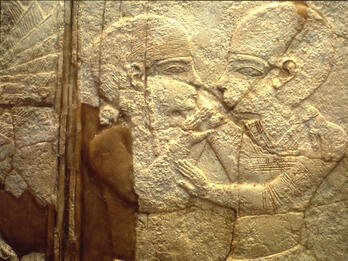The Song at the Sea
Biblical Period
1Then Moses and the Israelites sang this song to the Lord. They said:
This poem, called “a song” (shirah), is inserted into the Exodus narrative. It celebrates God’s defeat of the Egyptian forces at the Sea of Reeds, recapitulating with poetic flourishes some of the events recounted in the prose of the preceding chapter in Exodus. Rich in imagery, hyperbole, and poetic license, it expresses unrestrained enthusiasm over the Israelites’ miraculous rescue from disaster. Formally, it is divided into three sections; each ends with a simile followed by a pair of lines addressed to God, in which the opening phrase of the first line is repeated in the second (vv. 5b–6, 10b–11, 16a–b). This is known as staircase parallelism or incremental repetition. The poem ends with a coda acclaiming God’s eternal rule (vv. 17–18). Its language and style suggest that it is an ancient poem, perhaps the oldest in the Bible. Victory poems were known throughout the ancient world. Another biblical example includes a short victory poem sung by the women welcoming the victorious David home from battle, in 1 Samuel 18:7: “The women sang as they danced, and they chanted: ‘Saul has slain his thousands; David his tens of thousands!’” (see Saul attempts to Kill David). Exodus 15 is written stichographically in Torah scrolls and in biblical manuscripts.
Related Guide
Biblical Poetry
Biblical poetry is characterized by short parallel lines, without a fixed meter or rhyming pattern, and include love poems, laments over the dead, victory poems, and laments, among others.
You may also like

Song at the Sea (Exodus 15), Leningrad Codex

The Song of Moses

Song of Moses (Deuteronomy 32), Aleppo Codex

The Song of Songs



